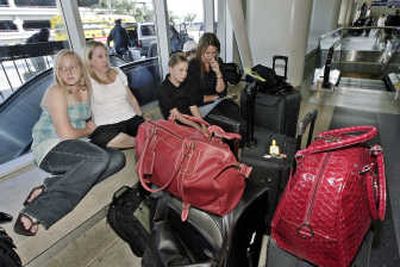American’s flight cancellations are likely to spread

WASHINGTON – The air travel misery will probably get worse.
Massive flight cancellations by American Airlines are likely to spread to other carriers as federal regulators step up their scrutiny of aircraft inspections after years of more lenient enforcement.
And as oversight tightens and Congress puts its glare on the airlines, passengers are paying the price.
Flying on U.S. airlines has never been safer. But mutual trust between the Federal Aviation Administration and carriers was undermined by last month’s revelation that Southwest Airlines flew planes that had missed inspections – a violation of federal standards.
Since then, the FAA has played hardball – auditing carriers’ maintenance records and promising a less cozy relationship with the industry. And the airlines only have to look at Southwest’s $10.2 million fine to recognize the cooperative spirit may be over.
“There’s always going to be extremes, just as there are in politics, and to some extent this is a political issue,” said Bob Harrell of New York-based travel and aviation consulting firm Harrell Associates.
The broken trust between airlines and regulators has created scheduling misery for the flying public. And as scrutiny of safety procedures rises, flight delays and cancellations could soon get worse, particularly for carriers with older fleets, Harrell said.
Roughly 250,000 passengers have been affected by the American cancellations this week so that its mechanics could inspect wiring in 300 jets. Thursday was the third straight day of trouble for customers of the nation’s largest carrier, particularly in New York, Chicago and Dallas, where bad weather magnified delays.
American said it is canceling 570 flights today. CEO Gerard Arpey said Thursday the cancellations will cost the company tens of millions of dollars, but he said American can withstand the losses.
Alaska Airlines and Midwest Airlines also canceled flights Thursday to inspect their Boeing MD-80s, while Delta Air Lines said it was likely to ground “a handful.”
Perhaps the worst part for travelers: There’s no way to know which carrier will be affected next.
Stacey Pillman, 42, of Miami, said she couldn’t help but keep glancing at the American Airlines departure board every five minutes Thursday at Miami International Airport. She stayed behind as her family left to buy magazines and snacks for the trip to Mexico City.
“I just want to stay here and see what happens. I am not one who likes surprises,” Pillman said.
In Washington, Nicholas Sabatini, the FAA official who ordered stricter compliance with federal safety standards after the Southwest debacle, faced tough questions from Congress about his responsibility for the lapses.
He told a Senate subcommittee he was accountable for the recent breakdowns in compliance, and blamed the Southwest incident on the failure of both FAA and airline employees.
Another sign of the political stakes: The Senate confirmation process for acting FAA Administrator Robert Sturgell, who was nominated by President Bush in October, has been put on hold.
Before the latest turmoil, the industry could point to a solid record of safety in recent years, a laurel the FAA could also rest on. The last U.S. crash of a jumbo jet was in November 2001, when an American Airlines flight plummeted into a New York City neighborhood, killing 265 people.
After a ValuJet flight crashed in Florida 12 years ago, some in Congress questioned the FAA’s dual mission of aviation regulation and promotion. But there has not been today’s level of government scrutiny on airlines since the industry was deregulated about 30 years ago, said Daniel Petree, dean of the College of Business at Embry-Riddle Aeronautical University in Daytona Beach, Fla.
FAA spokeswoman Lynn Tierney said the agency is simply doing its job.
“We are aware and sympathetic … but the role is clear, it’s a regulator’s role,” Tierney said. “We understand the disruption this causes, but (the airlines) had 18 months to complete the work.”
Tierney was referring to the safety order issued on the Boeing Co. MD-80 aircraft that recently have been grounded. The FAA ordered visual inspections of certain wire bundles on those planes after reports of shorted wires, evidence of worn-down power cables, and fuel system reviews conducted by the manufacturer. The order was effective Sept. 5, 2006, and the airlines had 18 months to comply.
Transportation Department Inspector General Calvin L. Scovel III on Thursday repeated his findings about the FAA’s inspection office responsible for Southwest Airlines having “developed an overly collaborative relationship” with the carrier.
The FAA last week announced a new reporting system designed to make it easier for inspectors to raise concerns and said it was strengthening ethics policies aimed at easing potential conflicts of interests.
“The FAA needs to do more than just trust these airlines,” Sen. Amy Klobuchar, D-Minn., said to conclude the hearing. “We have some good ideas on the table, but we need to go beyond the letter-writing back and forth and into action.”